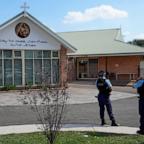Everything you need to know about FISA wiretaps
FISA courts meet in secret -- sometimes in the middle of the night.
— -- President Trump sparked a firestorm this morning when he suggested that his predecessor, Barack Obama, had ordered wiretaps on Trump Tower prior to the November 2016 election.
An Obama spokesperson vehemently denied the former president's involvement, saying: "A cardinal rule of the Obama administration was that no White House official ever interfered with any independent investigation led by the Department of Justice. As part of that practice, neither President Obama nor any White House official ever ordered surveillance on any U.S. citizen. Any suggestion otherwise is simply false."
The president has already faced massive scrutiny over his campaign's alleged contacts with Russian officials -- an assertion Trump has repeatedly denied as "fake news." It has been widely reported that Attorney General Jeff Sessions, a Trump campaign surrogate, and Trump's son-in-law and senior adviser, Jared Kushner, met with the Russian ambassador before the inauguration.
Trump's remarks raise questions about whether a wiretap on Trump Tower could have been legally approved, possibly through a FISA court. Here's what you need to know.
The Court
The Foreign Intelligence Surveillance Court, commonly referred to as the "FISA Court," is a secret tribunal with legal authority to grant (or deny) warrants for electronic surveillance against would-be spies or terrorists.
The court -- made up of 11 federal judges, serving 7-year terms and selected by the chief justice of the Supreme Court -- meets in private, sometimes in the middle of the night. FISA targets are highly classified.
The FISA Court was authorized under the Foreign Intelligence Surveillance Act of 1978, passed in the wake of Watergate and other intelligence abuses uncovered by the Church Committee. It allows the government to eavesdrop on any "foreign power or an agent of a foreign power" engaged in espionage or terrorism.
The act clarifies that although a U.S. citizen may be classified as an agent of a foreign power, he or she cannot be categorized that way "solely upon the basis of activities protected by the first amendment to the Constitution of the United States."
The Stats
More than a thousand applications for electronic surveillance, all signed by the attorney general, are submitted each year, and the vast majority are approved.
Related Stories
From 2009 to 2015, for example, more than 10,700 applications for electronic surveillance were submitted, and only one was denied in its entirety, according to annual reports sent to Congress. Another one was denied in part, and 17 were withdrawn by the government.
“That shouldn’t lead anyone to believe it’s easy to get the order," said Matt Olsen, a former NSA official who is now an ABC News contributor. "The fact that the government is successful in almost always getting approval is just an indication the government knows what the standard is."
According to George Washington Law School professor and longtime FISA critic Jonathan Turley, “FISA was designed more to facilitate than to limit surveillance. It adopted a standard that was heavily weighted toward approval. You almost have to work to find a way to get turned down by a FISA court."
The Scandal
In 2013, when NSA contractor Edward Snowden leaked a secret court order that showed the court had approved an application to collect metadata from the phones of millions of Americans each day, a scandal erupted.
Opponents argued that the court relied on one-sided arguments, criticizing the covert nature of its "rubber stamp" rulings. But other government officials pointed out that privacy tradeoffs were necessary to maintain the security of the nation.
Other Types of Taps
Going to a FISA court isn't the only avenue officials can use to authorize a wiretap. Non-intelligence, criminal wiretap warrants can be obtained through Title III of the Omnibus Crime Control and Safe Streets Act of 1968. Title III warrants, which require that the individual under surveillance is using the device in connection with a past or future crime, are often used in drug trafficking cases.
ABC News' Morgan Winsor, Jack Date and Jordyn Phelps contributed to this report.



